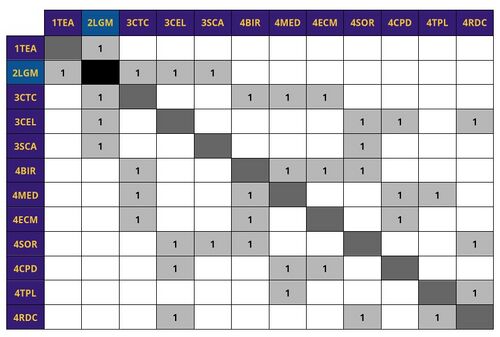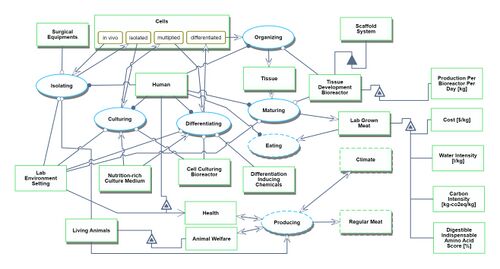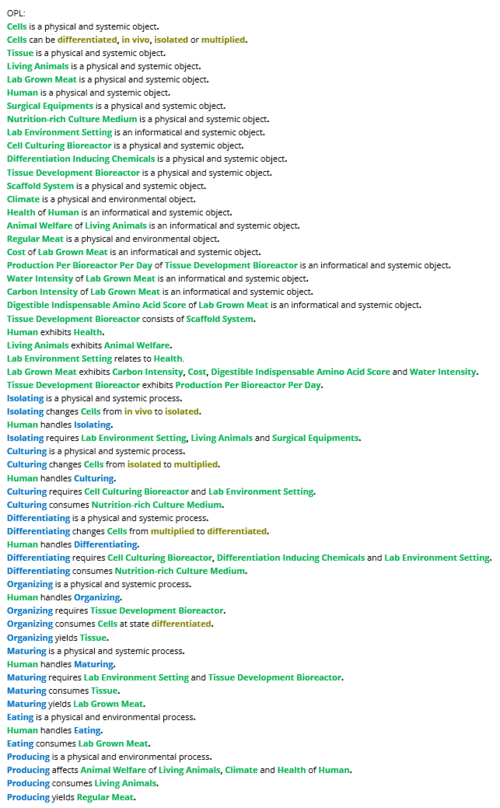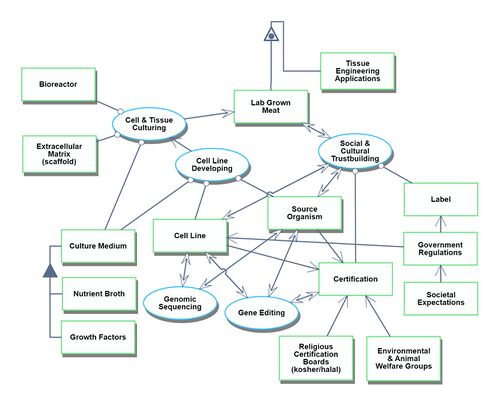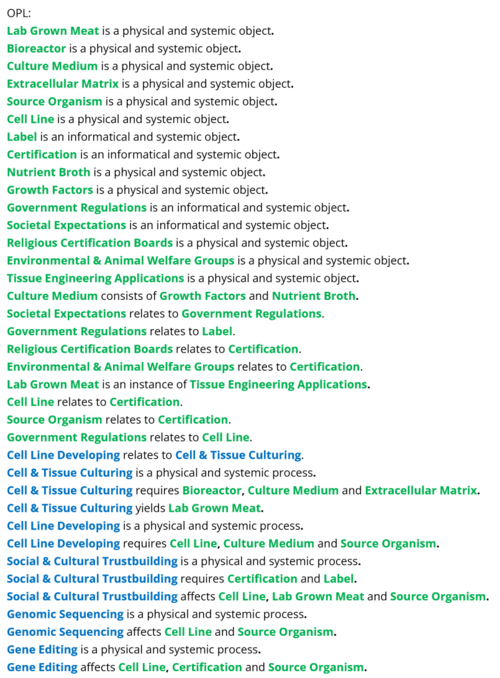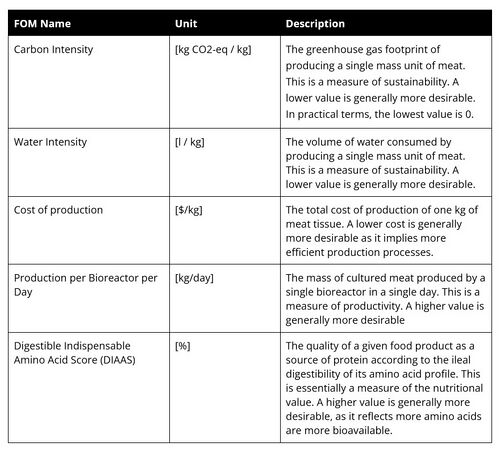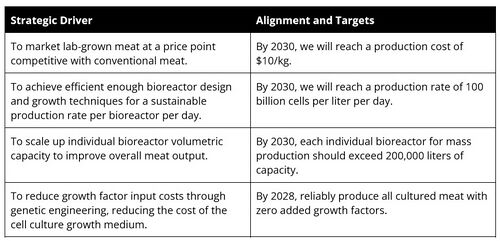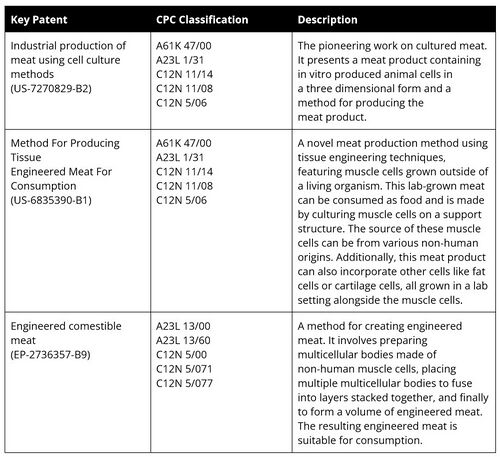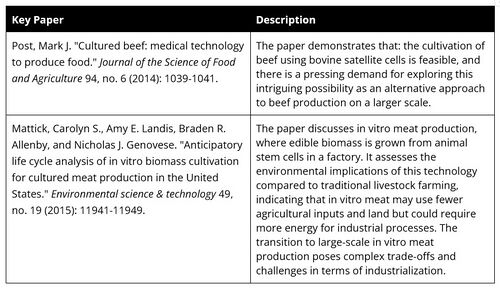Difference between revisions of "Lab Grown Meat"
| Line 54: | Line 54: | ||
==Alignment with Strategic Drivers== | ==Alignment with Strategic Drivers== | ||
Current companies producing lab grown meat are Upside (formerly known as Memphis Meats), Believer Meats, and GOOD Meat. GOOD Meat has the single largest bioreactor for cultivated meat at 6000 L in size. After comparing and contrasting the strategic drivers of these other companies, we can create our own: | |||
[[File:alignment.jpg|500px]] | |||
For reference, the strategic drivers of GOOD Meat include driving “their serum-free media cost further down from the current $1 per liter to ‘tens of cents,’ according to Tetrick, allowing the company to produce “hundreds of thousands of pounds” of cultivated meat.” GOOD Meat’s “next phase is to install vessels north of 100,000 liter each, which will enable tens of millions of pounds.” GOOD Meat is also the first company to start selling chicken nuggets and chicken breasts through restaurants and food vendors in Singapore, and dishes cost about $18.5 singaporean dollars (or $14 USD). | |||
Believer Meats, another startup from Israel, “recently claimed to have achieved a production density of 100 billion cells per liter,” in addition to using a “medium that costs less than $5 per liter.” | |||
[1] https://www.forbes.com/sites/douglasyu/2023/01/18/eat-just-to-scale-up-cultured-meat-production-on-gaining-new-regulatory-approval-in-singapore/?sh=70b8476349d7 | |||
[2] https://www.forbes.com/sites/douglasyu/2023/01/18/eat-just-to-scale-up-cultured-meat-production-on-gaining-new-regulatory-approval-in-singapore/?sh=70b8476349d7 | |||
==Position of Competition== | ==Position of Competition== | ||
Revision as of 16:59, 2 November 2023
Roadmap Overview
This roadmap focuses on cellular agriculture for meat production, which is also commonly referred to as cultured meat or lab-grown meat. This technology permits one to generate edible meat products without rearing and slaughtering livestock. Instead, operators can obtain targeted tissue and cell samples from the desired organism and then culture them in a bioreactor to fabricate meat products that are biologically identical and structurally similar to their conventional counterparts. Anticipated benefits of this technology are increased water efficiency, reduced feed requirements, and lower risks of zoonotic disease transfer.
Taxonomically, cellular agriculture can be categorized as a transform process that applies to organisms, corresponding to (L,1) in the five-by-five Expanded Technology Matrix. This technology takes tissues and cells that ordinarily develop in vivo and provides circumstances that allow them to develop in vitro.
- Tissue Engineering Applications (1TEA)
- 2ORG: Organ Regeneration
- 2VOF: In Vitro Organ Fabrication
- 2IVM: In Vitro Model
- 2OOC: Organ-on-a-Chip
- 2ARW: Artificial Womb
- 2LGM: Lab-Grown Meat
- Lab-Grown Meat (2LGM)
- 3CTC: Cell/Tissue Culturing
- 3CEL: Cell Line Development
- 3SCA: Socio-Cultural Acceptance
- Cell/Tissue Culturing (3CTC)
- 4BIR: Bioreactor
- 4MED: Culture Medium
- 4ECM: Extracellular Matrix (Scaffold)
- Cell Line Development (3CEL)
- 4SOR: Source Organism
- 4CPD: Cell Proliferation and Differentiation
- Socio-Cultural Acceptance (3SCA)
- 4TPL: Transparent Labeling
- 4RDC: Religious Diet Certification
Design Structure Matrix (DSM) Allocation
Roadmap Model using OPM
Techno-System OPD for Lab Grown Meat
Roadmapping OPD for Lab Grown Meat
Figures of Merit
Alignment with Strategic Drivers
Current companies producing lab grown meat are Upside (formerly known as Memphis Meats), Believer Meats, and GOOD Meat. GOOD Meat has the single largest bioreactor for cultivated meat at 6000 L in size. After comparing and contrasting the strategic drivers of these other companies, we can create our own:
For reference, the strategic drivers of GOOD Meat include driving “their serum-free media cost further down from the current $1 per liter to ‘tens of cents,’ according to Tetrick, allowing the company to produce “hundreds of thousands of pounds” of cultivated meat.” GOOD Meat’s “next phase is to install vessels north of 100,000 liter each, which will enable tens of millions of pounds.” GOOD Meat is also the first company to start selling chicken nuggets and chicken breasts through restaurants and food vendors in Singapore, and dishes cost about $18.5 singaporean dollars (or $14 USD).
Believer Meats, another startup from Israel, “recently claimed to have achieved a production density of 100 billion cells per liter,” in addition to using a “medium that costs less than $5 per liter.”
